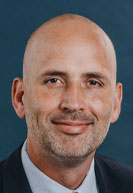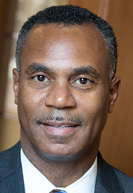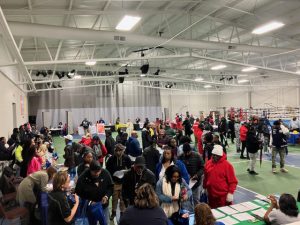Subscriber Benefit
As a subscriber you can listen to articles at work, in the car, or while you work out. Subscribe NowA line of people that started at a metal detector and snaked into the parking lot formed at Lucas Oil Stadium on a recent Tuesday morning, well before the doors to the stadium opened for the Marion County Prosecutor’s Office’s Second Chance Workshop.
Waiting for them inside on the stadium’s concourse was a team of legal professionals and other volunteers.
Attendees started by giving some basic information about what they were there to get help with — a suspended driver’s license, an expungement, child support payments and other services.
They then waited to hear their name called so they could sit down with a volunteer attorney to go through their issue and figure out what to do.
And while many of the people who show up to the office’s Second Chance Workshops are looking for some kind of legal help, there are also plenty of other resources offered through community vendors, including violence prevention programs, a diaper bank and job opportunities.

Marion County Prosecutor Ryan Mears said the workshops, which started in 2019, are an opportunity to have “meaningful interactions” with people.
“One of the biggest challenges we have is building trust in the community and making sure people understand that the prosecutor’s office is here to help,” he said at the workshop.
Mears, wearing khaki pants and a tucked-in “317” shirt, said he wants others to see the prosecutor’s office as people who are trying to help.
“That’s really important to us,” he said, “making sure that we send that message to the community.”
All told, more than 600 people attended, according to the prosecutor’s office.
There were about 30 resource vendors to go along with some 100 attorneys who volunteered throughout the day.
Mears said one of the biggest legal needs in Marion County involves suspended driver’s licenses. There are about 100,000 suspended licenses in the county, according to the prosecutor’s office, which represents about 10% of the entire population — driving age or not.
The “vast majority” of people with a suspended license, Mears said, are in that situation not because they’re bad drivers, but because of financial hardships.
A significant part of what the workshops offer is helping people work through fines and fees, including waiving some reinstatement fees.
Just because someone gets a ticket for speeding doesn’t mean they’re done driving, Mears said, because they still have a job to get to and other parts of life to take care of.
‘It was infectious’

For volunteer attorney Casey Farrington, the workshop at Lucas Oil Stadium was her first. She said it was nice to be around others who were also passionate about helping people.
“It was infectious,” said Farrington, an appellate attorney at the Marion County Public Defender Agency, which helped put the event together.
Farrington was there for a half day and said she helped four people, all of whom were there at least in part for a suspended driver’s license.
“The bureaucracy can be so challenging to navigate, even as an attorney,” she said. “If you don’t have that training, something that should be simple can be really hard.”
Farrington said it was a little intimidating not knowing exactly what issues someone was going to expect her to help solve. She said she met other lawyers at the event who felt the same way.
“The pace of seeing people in that setting was a little scary,” she said, “but once I was in it, it reminded me this is why I wanted to become an attorney.”
Other similar programs in Indiana
Those familiar with the statewide legal landscape say Marion County’s workshops probably represent the largest of such efforts in Indiana.
But other prosecutor’s offices are doing similar work.
In St. Joseph County, a series of clinics focused on expungements.

Andre Gammage, a magistrate judge in Mishawaka, said he started working with the St. Joseph County Prosecutor’s Office a few years ago to host what they called “Fresh Start Friday.” There were four clinics, he said, each in a different part of South Bend.
The clinics back then were also to help with suspended driver’s licenses.
Gammage said even though that work is still needed, it was a lot for volunteers to handle.
Volunteers at the clinics, including more in November 2022 and the most recent one in April, included local attorneys and law students from the University of Notre Dame. They’ve been helping file expungement petitions.
For all the clinics combined, Gammage, who is also an adjunct law professor at Notre Dame, said they’ve done about 1,300 to 1,500 petitions.
And Gammage said he’s seen the impact firsthand.
Just a few weeks ago, he said a man told him that the clinic helped change his life and that he’s gotten jobs he couldn’t have before.
Then there was a man at a gas station near Notre Dame who thanked Gammage. The man said he was able to get his driver’s license back and had been making money by transporting people for the football team’s spring game.
Even people who are retired and don’t necessarily need an expungement for employment are still coming to the clinics, Gammage said.

“To be able to have this leave you mentally is freedom,” he said.
In Hamilton County, deputy prosecutor Joshua Kocher said the prosecutor’s office has a policy that says, in general, if someone gets a charge for driving with a suspended license and then gets their license back — or gets a valid license for the first time in some cases — the office will dismiss the case.
“It comes up all the time,” Kocher said.
The office tries to run reports through the Bureau of Motor Vehicles ahead of initial hearings so they can see if there are any cases that can be dismissed, he said.
There are some exceptions to the policy, Kocher said, such as not dismissing the case if there are other charges like a drug offense. But he said getting people to drive legally is some of the best rehabilitation work the prosecutor’s office can do.
“At the end of the day, we want people to have a valid license,” he said.
‘They’re helping out’
One of the roughly 600 people who went to Lucas Oil Stadium for the recent workshop was 39-year-old Antonio Bledsoe, who said he’s had a suspended driver’s license since 2019.
Bledsoe said volunteers helped him with a reinstatement fee.
He also got help with an expungement and was going home with a safety box for his gun.
Doors opened for the workshop at 10 a.m., and Bledsoe walked out of the stadium before noon.
He said that was his first time going to one of the workshops, adding that he didn’t know about it until a friend sent him a flyer.
“They’re helping out,” Bledsoe said. “ … I was never a bad person anyway.”•
Please enable JavaScript to view this content.

